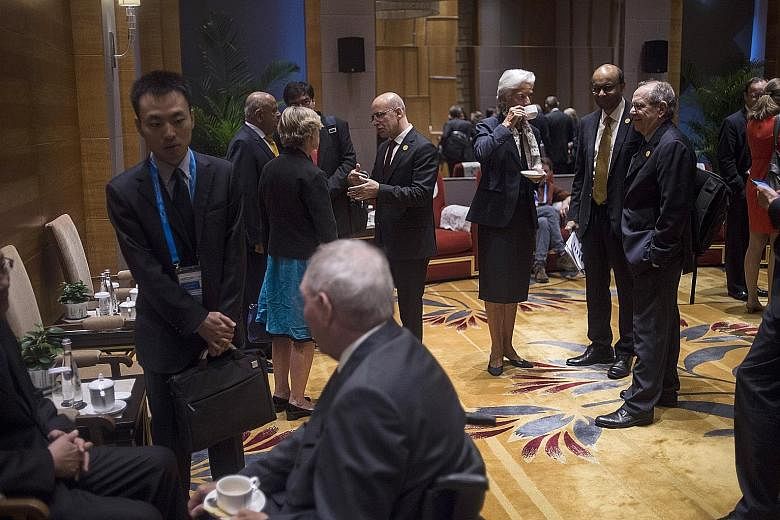CHENGDU • The world's leading economies must do more to boost slowing global growth, the International Monetary Fund (IMF) and Washington urged as G-20 finance ministers gathered yesterday, with Britain's vote to leave the European Union threatening more disruption.
Central bank chiefs and finance ministers from the world's top 20 economies met in the south-western Chinese city of Chengdu, and United States Treasury Secretary Jacob Lew told journalists it was "a time of continuing uncertainty in the global economic outlook".
"When you look at the political developments around the world, most recently the referendum in the United Kingdom, it really reinforces the importance of concentrating on shared growth," he said.
Britain's new finance minister Philip Hammond yesterday met his German counterpart Wolfgang Schaeuble for the first time, and held talks with Chinese central bank chief Zhou Xiaochuan. "In Chengdu for G-20 - will be reassuring world that Britain is open for business and will continue to be a competitive open trading nation," he tweeted.
According to a draft communique the G-20 will seek to stress that the impact of Brexit can be tackled, Bloomberg News reported.
"Members of the G-20 are well positioned to proactively address the potential economic and financial consequences stemming from the UK referendum," it quoted the draft document as saying.
Just ahead of the meeting, the IMF called on key G-20 nations to boost government spending.
"Global growth remains weak, and downside risks have become more salient," the Washington- based lender said in a report. "Growth could be even lower if the current increases in economic and political uncertainty in the wake of the 'Brexit' vote continue."
In its most recent forecast, the IMF lowered its forecasts for global growth this year and next by 0.1 per cent, to 3.1 per cent and 3.4 per cent respectively. It wants advanced economies such as Germany and the US to channel more public spending into infrastructure investment to help boost growth, an issue that has sparked divisions among members.
But Berlin, in particular, has a long history of fiscal rigour and argues that government spending is ineffective at boosting growth, while monetary moves such as ultra-low interest rates, and a flood of liquidity and credit are counterproductive.
Other challenges loom besides Brexit, including what one official at the G-20 referred to as the "Three Ts" - terrorism, Turkey and Trump.
The recent attack in the French city of Nice, which killed 84 people, the third major incident in the European country over the past 18 months, has rattled financial markets.
Also, a gunman in Munich, Germany, killed nine people on Friday.
A failed coup in Turkey which had aimed at unseating President Recep Tayyip Erdogan and his huge subsequent crackdown on opponents, has alarmed Ankara's Western allies.
The US presidential election, in which tycoon Donald Trump has sealed the Republican party nomination and will face Democrat Hillary Clinton, could add uncertainty if the contest is close.
AGENCE FRANCE-PRESSE

